Introduction
Can rabbits eat carrots? Let’s find out.
Picture this: an adorable bunny binkying with joy as it nibbles on a bright orange carrot, crunching away with delight. Carrots have long been hailed as a healthy snack for humans, but did you know that they may not be as innocent as they appear when it comes to our furry friends’ digestive health?
Strap yourselves in, because we’re about to unveil the truth about carrots and their potential risks on our beloved fluffballs.
Now, before you start panicking and emptying your fridge of all those carrot bags, let’s take a hop back and explore the reasons why rabbits have such an affinity for carrots. They’re not just drawn to the vibrant color and satisfying crunch – carrots are packed with essential nutrients like beta-carotene, vitamin A, and fiber, making them seem like the perfect choice for our herbivorous companions.
But hold your hoppers! While carrots may offer nutritional benefits, they also come with a few dangers.
And let’s not forget about the fiber factor – while carrots do provide some fiber, they may not be the ideal choice for maintaining a healthy gut.
But fear not, my curious rabbit enthusiasts! This article is your guide to finding the perfect balance when it comes to feeding carrots to your furry friends.
So get ready to hop on this carrot-filled adventure, because we’re about to unravel the mysteries behind this beloved bunny snack.
So grab a carrot, settle in with your bunny buddy, and let’s embark on a carrot-licious journey that will keep your rabbits healthy, happy, and hopping with joy! Trust me, this is an article you don’t want to miss.
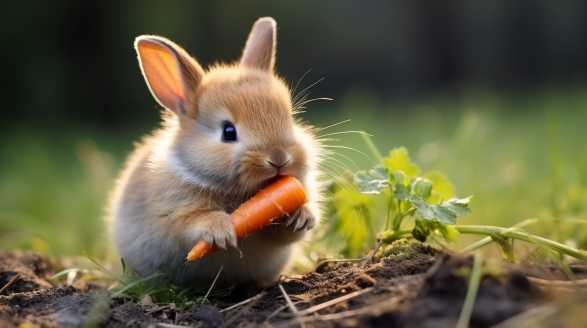
Key Takeaways
- Carrots offer nutritional benefits for rabbits, such as vitamin A and fiber, but should be given in moderation due to their high sugar content.
- Excessive carrot consumption can lead to digestive issues, weight gain, and tooth decay in rabbits.
- It is important to practice portion control and offer a balanced diet, including hay and leafy greens, to maintain a healthy digestive system in rabbits.
- Carrot tops can be safely fed to rabbits, but it is important to wash them thoroughly and introduce them gradually.
- Baby rabbits can eat carrots, but they should be introduced slowly and in small amounts.
- Both raw and cooked carrots can be given to rabbits, but moderation is crucial.
- It is essential to monitor your rabbit for any signs of digestive distress or allergic reactions to carrots.
- A well-rounded diet for rabbits includes hay, leafy greens, vegetables, limited fruits, and fresh water.
- Portion control is important to prevent rabbits from overeating carrots and to maintain a balanced diet.
- If your rabbit shows signs of allergies or adverse reactions to carrots, consult a veterinarian for proper diagnosis and management.
Carrots: A Potential Cause of Digestive Issues in Rabbits
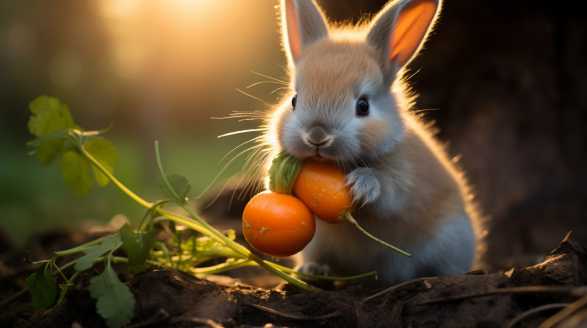
As a rabbit owner, I have always been fascinated by the various vegetables and fruits that my furry friend can devour. One particular vegetable that seems to have captured the affection of rabbit lovers around the world is the humble carrot.
I will uncover the potential risks associated with feeding carrots to rabbits and provide you with some crucial information to ensure the well-being of your beloved pets.
The Deceptive Delight: Carrots
A Staple in Bunny Diets
Carrots have long been hailed as a healthy snack for humans and have found their way into rabbit diets due to their vibrant color and enticing crunch. They are packed with essential nutrients such as beta-carotene, vitamin A, and fiber, making them a seemingly perfect choice for our herbivorous companions.
The Sugar Content Conundrum
One of the main concerns with carrots is their high sugar content. While these sweet orange sticks may be a tasty treat for us, rabbits have delicate digestive systems that are not well-equipped to handle high levels of sugar.
The Unseen Fiber Effects
While carrots are indeed a good source of fiber, they are not the ideal choice for your rabbit’s digestive health. Rabbits require a diet high in long-strand fiber to promote gut motility and maintain a healthy digestive system.
This can result in digestive issues such as constipation or gastrointestinal stasis (a condition where the gut slows down or stops completely).
A Balancing Act: Moderation is Key
The Art of Portion Control
To ensure your rabbit’s well-being, it is important to provide carrots in moderation. A suitable guideline is to offer a quarter-sized piece of carrot per day for every 2 pounds of body weight.
Supplementing with Safer Alternatives
While carrots may pose some risks, there are plenty of other safe and nutritious options that can be included in your rabbit’s diet. Leafy greens, such as romaine lettuce, spinach, and kale, are low in sugar and high in essential nutrients.
Observation and Adaptation
Every rabbit is unique, and it is crucial to monitor your pet’s response to carrot consumption. Keep an eye out for any signs of digestive distress, such as bloating, diarrhea, or a lack of appetite.
A Well-Rounded Diet: Beyond Carrots
Hay, Hay, and More Hay
As mentioned earlier, hay should form the foundation of your rabbit’s diet. It provides the essential fiber needed for digestive health.
Aim for 80% of your rabbit’s diet to consist of fresh, good-quality hay.
Leafy Greens Galore
Leafy greens play a vital role in your rabbit’s diet by supplying necessary vitamins and minerals without the excess sugar found in carrots. Dark, leafy greens such as parsley, cilantro, and dandelion greens are excellent choices.
A Dash of Colorful Vegetables
In addition to leafy greens, a small amount of other vegetables can be offered to your rabbit. Vegetables like broccoli, bell peppers, and zucchini are low in sugar and provide various essential nutrients.
Limited Fruit Feasts
While rabbits have a sweet tooth, fruits should be offered sparingly due to their high sugar content. Small portions of fruits like apples, strawberries, and blueberries can be given as an occasional treat.
Water It Down
Finally, never forget the importance of fresh, clean water for your rabbit. Ensure that a constant supply of water is available at all times to keep your furry friend hydrated and aid in digestion.
While carrots may be portrayed as the perfect snack for rabbits, their potential to cause digestive issues should not be overlooked. By practicing moderation, offering a well-rounded diet, and closely observing your pet’s response to various foods, you can ensure that your rabbit enjoys a healthy and fulfilling life.
So, go ahead and treat your bunny to a delightful variety of foods, keeping their delicate digestive system in mind.
Introducing Carrots to a Rabbit’s Diet: Step-by-Step Guide
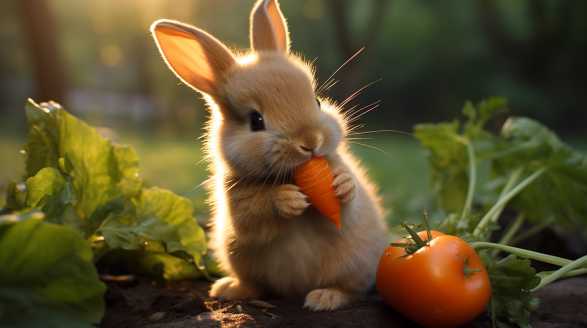
Are Carrots Safe for Rabbits?
As a devoted rabbit owner, I understand the importance of providing a balanced diet for our furry friends. One question that frequently arises is whether carrots are safe for rabbits.
However, it is essential to introduce carrots properly to prevent any digestive issues. In this step-by-step guide, I will explain how to incorporate carrots into your rabbit’s diet while ensuring their well-being.
Step 1: Understanding the Nutritional Benefits of Carrots
Carrots are known for their vibrant orange color and delightful crunch, but did you know they also offer several nutritional benefits for rabbits? Carrots are rich in vitamin A, which promotes healthy vision, skin, and fur.
Step 2: Moderation is Key
While carrots have numerous benefits, it’s crucial not to go overboard. Rabbits have sensitive digestive systems, and overfeeding them carrots can lead to gastrointestinal issues like diarrhea.
Step 3: Selecting Fresh and Organic Carrots
Now that we understand the importance of moderation let’s move on to choosing the right carrots for your bunny. Always opt for fresh, organic carrots and avoid those that appear dull, wilted, or moldy.
Step 4: Preparing the Carrots
Before serving carrots to your rabbit, it’s important to follow some preparation steps. Begin by washing the carrots thoroughly to remove any dirt or pesticides.
Finally, cut the carrots into small, bite-sized pieces to make them easier for your bunny to chew.
Now comes the exciting part – introducing carrots to your rabbit. Start by offering a small piece of carrot as a treat, no larger than the tip of your finger.
If they seem hesitant or disinterested, don’t worry, it may take a few tries for them to discover their love for carrots.
Step 6: Gradually Increase Carrot Intake
Once your rabbit shows enthusiasm for carrots, you can gradually increase the portion size. However, remember to maintain moderation and always prioritize the main components of their diet – hay, fresh water, and leafy greens.
Step 7: Monitor Digestive Health
A responsible rabbit owner always keeps a close eye on their furry friend’s well-being. After incorporating carrots into your rabbit’s diet, pay attention to any changes in their digestion.
If you notice any of these changes, consult a veterinarian promptly.
Step 8: Variety is the Spice of Life
Even though your rabbit may love carrots, it is essential to offer them a variety in their diet. Carrots should be just one component of a well-rounded menu.
This variety will keep your rabbit excited about mealtime and ensure they receive all the necessary vitamins and minerals.
By following this step-by-step guide, you can safely introduce carrots into your rabbit’s diet and watch them enjoy this nutritious treat. Remember, moderation, fresh quality carrots, and frequent monitoring of your rabbit’s well-being are key to maintaining their digestive health.
Can Baby Rabbits Eat Carrots?
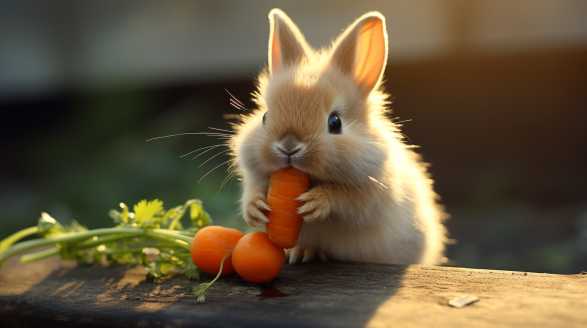
When it comes to our adorable furry friends, it’s not uncommon for rabbit owners to wonder about their furry friend’s diet. One of the questions that often pops up is, “can baby rabbits eat carrots?” It’s a valid concern, especially when we want to ensure our bunnies are getting the right nutritional balance.
The Curiosity Begins
As a proud owner of these adorable fluffy bundles of joy, I always find myself fascinated by their never-ending curiosity. It’s no surprise that they’re always on the lookout for new treats and nibbles.
The Natural Herbivores
Before we explore the carrot-rabbit connection, let’s talk about rabbits’ natural diet. Baby rabbits, like their adult counterparts, are herbivores.
As baby rabbits grow, they will learn to chew on hay, which will play a major role in their dental health.
A Burst of Joy
Carrots, with their crunchy texture and sweet taste, seem like a natural choice for our beloved bunnies. However, when it comes to baby rabbits, we should exercise a bit of caution.
The Nutritional Aspect
Baby rabbits require a specific nutritional balance to support their growth and development. Carrots, although rich in vitamin A, contain higher amounts of sugar and starch compared to other greens.
A Balanced Diet for Fluffy Pals
Now that we know carrots should be approached with moderation, let’s discuss the ideal diet for baby rabbits.
1. Unlimited Hay
Hay is an essential part of a rabbit’s diet, providing essential fiber and promoting healthy digestion. Ensure a constant supply of fresh hay, such as Timothy or Meadow hay, to keep your baby bunny happy and healthy.
2. Fresh Greens
Leafy greens should make up a significant part of a baby rabbit’s diet. Offer a variety of safe greens such as romaine lettuce, spinach (in moderation), and parsley.
3. Pellets and Water
Baby rabbits may benefit from specially formulated pellets, which provide a balanced mix of nutrients. Opt for high-quality pellets without added sugars.
Moderation is Key
While carrots can be a tasty addition to a baby rabbit’s diet, it’s crucial to limit their intake. The high sugar content can lead to weight gain and other digestive issues if consumed excessively.
Tips for Treat Time
- Cut carrots into small, bite-sized pieces to avoid choking hazards.
- Always monitor your baby rabbit while enjoying their carrot treat.
- Introduce treats gradually to avoid upsetting their delicate digestive system.
The Bunny Bowl of Dos and Don’ts
Now that we’ve covered the main points, here’s a quick “Bunny Bowl” summary of what you need to know:
Dos
- Offer a variety of fresh leafy greens.
- Provide a constant supply of hay.
- Choose high-quality pellets without added sugars.
- Give a small occasional slice of carrot as a treat.
Don’ts
- Overfeed carrots to baby rabbits.
- Introduce new foods abruptly.
- Forget to monitor your bunny during treat time.
- Neglect their need for a balanced diet.
While baby rabbits can certainly enjoy the occasional carrot treat, it’s important to remember that moderation is key. Providing a balanced diet of hay, fresh greens, and pellets should be the primary focus to ensure your baby bunny grows up strong and healthy.
The Nutritional Value of Carrots
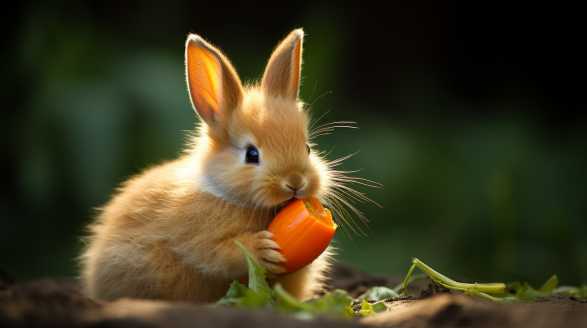
Before we look into the cooked vs. raw dilemma, let’s explore the nutritional benefits of carrots for rabbits. Carrots are rich in essential vitamins and minerals, making them a nutritious option for your bunny.
- Vitamin A – essential for maintaining good vision and a healthy immune system.
- Vitamin K – aids in blood clotting and strong bones.
- Potassium – supports heart and muscle function.
- Fiber – crucial for maintaining a healthy digestive system.
- Antioxidants – help prevent cell damage and promote overall well-being.
Raw Carrots: The Classic Choice
Giving your rabbit raw carrots is a classic way to provide them with a crunchy and nutritious treat. Here are some reasons why raw carrots may be the preferred option for your bunny:
- Dental Health: Rabbits’ teeth continuously grow, and chewing on hard, fibrous foods like raw carrots helps wear them down, preventing dental issues.
- Hydration: Raw carrots have high water content, which aids in keeping your rabbit hydrated, especially during hot weather.
- Mental Stimulation: Rabbits love to crunch on vegetables, and the act of gnawing on a raw carrot can provide mental stimulation, reducing boredom.
Tips for Serving Raw Carrots
- Wash the carrots thoroughly to remove any dirt or pesticides.
- Cut them into manageable pieces to avoid choking hazards.
- Feed carrots in moderation, as excessive consumption may lead to weight gain.
Cooked Carrots: A Twist for Taste
While raw carrots are a popular choice, cooked carrots can be a delightful variation to offer your rabbit. Here are a few reasons why cooked carrots might be beneficial:
- Enhanced Digestibility: Cooking carrots makes them softer and easier to digest for rabbits with sensitive stomachs or dental issues.
- Variety: By introducing cooked carrots, you can add some excitement and variety to your rabbit’s diet, preventing boredom and encouraging healthy eating habits.
- Aging Rabbits: Older rabbits with weakened teeth may find raw carrots challenging to chew. Cooking them can make the carrots more accessible and enjoyable for consumption.
Tips for Serving Cooked Carrots
- Steaming or boiling carrots until tender is the best method of preparation for rabbits.
- Allow the cooked carrots to cool before serving them to your bunny to avoid any burns.
- Avoid using any seasoning or oils when cooking carrots for your rabbit.
Moderation is Key
Regardless of whether you choose to serve raw or cooked carrots, moderation is essential for a balanced diet. Carrots should be seen mainly as a treat due to their high sugar content.
Aim to include a variety of vegetables in your bunny’s diet to ensure they receive a well-rounded nutritional intake.
Other Veggie Options for Rabbits
While carrots are beloved by rabbits, it is essential to diversify their diet. Here are some other veggies you can introduce to your rabbit’s meal plans:
- Leafy Greens: Kale, romaine lettuce, and spinach are excellent choices that provide additional vitamins and minerals to support your rabbit’s health.
- Bell Peppers: These colorful vegetables are not only crunchy but also packed with vitamin C, promoting a healthy immune system.
- Herbs: Parsley, basil, cilantro, and dill are fantastic additions to your rabbit’s diet, adding flavor and nutritional value.
Experiment and Observe
Every rabbit is unique, with varying tastes and preferences. Some rabbits may prefer raw carrots, while others may enjoy the softer texture of cooked carrots.
Signs your Rabbit Enjoys Carrots
- Eagerly accepting carrots when offered.
- Wagging their tail or displaying excitement when they see carrots.
- Chewing the carrots with gusto.
Signs your Rabbit Dislikes Carrots
- Ignoring the carrots when offered repeatedly.
- Spitting out or flicking pieces of carrot away.
- Eating around the carrot and leaving it behind.
When it comes to feeding rabbits carrots, both raw and cooked options have their merits. Raw carrots are excellent for dental health and hydration, while cooked carrots provide variety and digestibility.
So, go ahead and treat your furry friend to some delicious carrots, cooked or raw, and watch them delight in this tasty and nutritious snack!
The Nutritional Benefits of Carrots for Rabbits
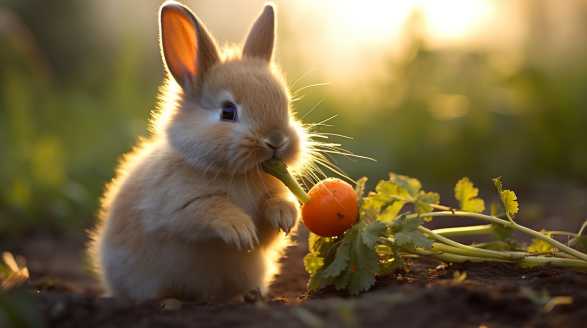
As a rabbit enthusiast and owner, I have always been intrigued by the nutritional benefits of various foods for my fluffy companions. One food that stands out for its vibrant color and crunchiness is the humble carrot.
So, let’s hop right into it!
Why Carrots are a Rabbit’s Delight
Rabbits absolutely adore snacking on carrots, and it’s not just because of their sweet taste and satisfying crunch. Carrots are packed with essential vitamins, minerals, and fiber that contribute to a rabbit’s overall health and well-being.
1. Vitamins Galore
Carrots are a fantastic source of various vitamins that help support a rabbit’s immune system, promote healthy bone development, and aid in maintaining a shiny coat. Here are some key vitamins found in carrots:
- Vitamin A: Essential for good vision, strong bones, and a healthy immune system.
- Vitamin K: Promotes healthy blood clotting and assists in maintaining healthy bones.
- B-vitamins: Including thiamine (B1), riboflavin (B2), and niacin (B3), which play vital roles in energy production, digestion, and overall cell health.
2. Mineral Riches
In addition to being a vitamin powerhouse, carrots also provide a range of important minerals that contribute to optimal rabbit health. These minerals include:
- Potassium: Essential for maintaining a healthy heart and regulating blood pressure.
- Calcium: Vital for maintaining strong bones and teeth.
- Phosphorus: Works alongside calcium for bone formation and energy metabolism.
- Magnesium: Supports muscle and nerve function, as well as a healthy cardiovascular system.
How Carrots Aid in Digestion
The high fiber content in carrots contributes to a rabbit’s digestive health, promoting regular bowel movements and preventing intestinal blockages. The majority of a rabbit’s diet should consist of fibrous foods, so introducing carrots can help meet their daily fiber requirements.
Moderation is Key
While carrots provide numerous benefits, it’s important to remember that moderation is key when it comes to incorporating them into your rabbit’s diet. Carrots should be considered as a treat or supplement to their main diet of hay, fresh greens, and pellets.
Tips for Feeding Carrots to Your Rabbit
Now that you know the nutritional benefits of carrots for rabbits, here are some tips for safely introducing this delightful veggie into their diet:
1. Variety is the Spice of Life
Just like humans, rabbits thrive on a varied diet. To keep things interesting and provide a range of nutrients, offer your rabbit a mix of different vegetables alongside carrots.
2. Fresh is Best
Always ensure that the carrots you offer your rabbit are fresh and free from any signs of spoilage. Opt for organic carrots whenever possible to minimize pesticide exposure.
3. Watch for Allergic Reactions
While rare, some rabbits may have allergies or sensitivities to certain foods, including carrots. To avoid any unpleasant reactions, introduce carrots slowly into your rabbit’s diet and monitor for any signs of digestive upset or allergic reactions such as itching, sneezing, or runny eyes.
4. Proper Portion Control
To prevent overfeeding and weight gain, limit carrot consumption to a small piece (around the size of your thumb) two to three times a week. This way, your rabbit can enjoy the nutritional benefits without any negative side effects.
5. Remember Hay is Key
Hay should always make up the majority of your rabbit’s diet, so don’t let their love for carrots overshadow the importance of quality hay. Offer unlimited hay to ensure a healthy digestive system and provide the necessary fiber.
Carrots have a wide array of nutritional benefits for rabbits. From providing essential vitamins and minerals to aiding in digestion and dental health, carrots are a fantastic addition to your furry friend’s diet.
Your rabbit will surely appreciate the crunchy goodness and nutritional perks of this vibrant veggie!
Carrot Tops: Are They Safe for Rabbits to Consume?
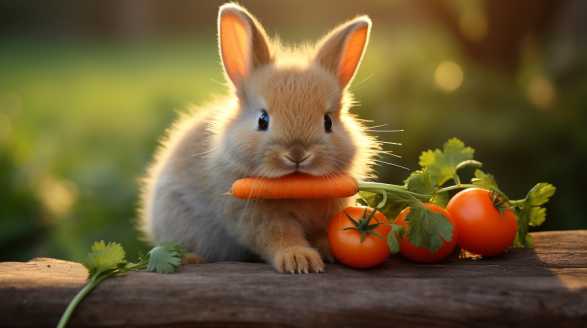
I have always been fascinated by rabbits. Their fluffy tails, their boundless energy, and their love for munching on fresh greens make them incredibly endearing creatures.
That’s why the question of whether it is safe for rabbits to consume carrot tops has piqued my curiosity.
Exploring the Nutritional Benefits
Carrot tops, also known as carrot greens or carrot leaves, are the leafy greens attached to the orange root vegetable we all know and love. These vibrant greens are packed with a plethora of nutrients that can potentially benefit our fluffy companions.
- Vitamin A: Carrot tops are rich in vitamin A, an essential nutrient for maintaining good eyesight and a healthy immune system for rabbits.
- Vitamin K: This nutrient plays a vital role in blood clotting, ensuring that rabbits have a healthy and well-functioning circulatory system.
- Calcium: Calcium is necessary for maintaining strong bones and teeth, and carrot tops contain a decent amount of this essential mineral for rabbits.
- Folate: Carrot tops are a great source of folate, a B vitamin that aids in red blood cell formation, supporting overall blood health.
- Fiber: Rabbits thrive on high-fiber diets, and carrot tops provide an additional source of fiber that can aid in digestion and prevent gastrointestinal disturbances.
Potential Risks to Consider
While carrot tops offer numerous nutritional benefits, it’s important to also consider potential risks. Like any new food introduced into a rabbit’s diet, there are a few factors to keep in mind:
- Pesticides: Carrot tops, like many leafy greens, can absorb pesticides if not grown organically. Always ensure that the carrot tops you offer to your rabbits are free from harmful chemicals.
- Oxalates: Carrot tops contain oxalates, compounds that can contribute to the formation of kidney stones in rabbits prone to urinary tract issues. Moderation is key.
- Carbohydrates: Carrots themselves are relatively high in carbohydrates, and while the tops contain fewer carbs, it’s important to consider overall carbohydrate intake, especially for rabbits with weight or diabetes concerns.
How to Safely Introduce Carrot Tops
Now that we have explored both the benefits and potential risks of carrot tops for rabbits, it’s time to look at how to safely introduce them into their diet:
- Consult with a vet: Before making any changes to your rabbit’s diet, it’s always best to seek advice from a veterinarian who specializes in rabbit care. They will provide specific guidance based on your rabbit’s individual needs.
- Start with small portions: Initially, offer a small amount of carrot tops to gauge your rabbit’s reaction. Gradually increase the serving size if they show no adverse effects.
- Wash thoroughly: Prior to feeding carrot tops to your rabbits, make sure to wash them thoroughly to remove any potential pesticides or dirt.
- Offer variety: Carrot tops should be given as part of a well-rounded diet. Pair them with other safe vegetables and hay to ensure your rabbits receive a balanced nutritional intake.
Carrot tops can be a safe and nutritious addition to a rabbit’s diet when introduced correctly. They offer a range of vital nutrients, including vitamin A, vitamin K, calcium, folate, and fiber.
By consulting with a veterinarian and following proper guidelines, you can ensure your fluffy companions enjoy the benefits of carrot tops without any harm. So, go ahead and treat your rabbits to some carrot tops, but always remember to prioritize their well-being and provide a balanced diet for their overall health.
The Role of Carrots in a Rabbit’s Diet
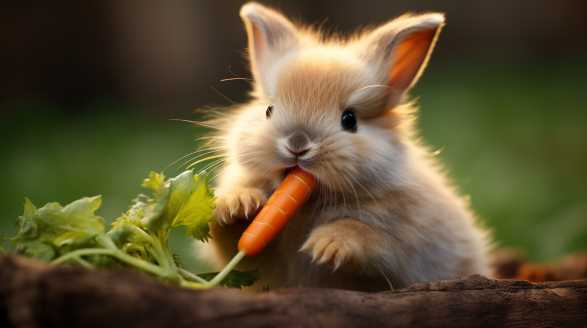
As a proud rabbit owner, I’ve spent hours researching the perfect diet for my fluffy companion. One food that often comes to mind when we think about bunnies is carrots!
Are they as essential as Bugs Bunny would have you believe? Join me as we discover the truth about the significance of these vibrant orange veggies in a rabbit’s nutritional needs.
Understanding a Rabbit’s Dietary Requirements
Before we dive into the world of carrots, let’s grasp the basics of a rabbit’s dietary needs. Our furry friends are herbivores, which means their diet should consist primarily of fiber-rich, leafy greens and small amounts of other vegetables.
Now that we have this foundation in place, let’s explore the realm of carrots!
The Carrot Craze: A Bunny’s Beloved Snack
Carrots: The Burst of Beta-Carotene
Carrots are renowned for their vibrant color and crisp texture, making them a favorite among rabbits. They are an excellent source of beta-carotene, which is converted into Vitamin A by a rabbit’s body.
Key Point: A carrot’s vibrant hue comes from beta-carotene, an essential nutrient for maintaining a rabbit’s eyesight.
Keeping the Pearly Whites in Tip-Top Shape
Bunnies have continuously growing teeth, which need regular wear and tear to prevent dental issues. Munching on crunchy carrots helps rabbits grind down their teeth, keeping them properly aligned and preventing overgrowth.
Key Point: Carrots act as the natural toothbrush for rabbits, helping to maintain proper dental health.
Fiber-Rich Goodness for a Happy Tummy
We all know that fiber is essential for a healthy digestive system, and rabbits are no exception. Carrots contain a considerable amount of fiber, promoting optimal gut motility for our floppy-eared pals.
Key Point: The high fiber content in carrots aids in maintaining a healthy digestive system for rabbits.
Mellowing Out with Carrots
Carrots are not just packed with nutrition; they also provide a calming effect on rabbits. The act of gnawing on a carrot allows bunnies to engage in a natural behavior called “chewing” or “scraping,” which helps them alleviate stress and boredom.
Key Point: Chewing on carrots has a soothing effect on rabbits, alleviating stress and boredom.
Moderation is Key: The Carrot Conundrum
While carrots provide numerous benefits, it’s important not to go overboard. As with any food, moderation is crucial to maintaining a well-balanced diet for our furry friends.
1. Quantity Matters
You should feed your rabbit carrots in moderation, generally offering them a few baby-sized carrots or a slice or two of a large carrot per day. Remember, carrots should complement a balanced diet, not become the main course.
2. Variety is the Spice of Life
While rabbits adore carrots, it’s vital to include a wide array of other fresh vegetables and leafy greens to ensure your rabbit is receiving a diverse mix of nutrients. Aim to rotate the veggies you offer, such as kale, spinach, and bell peppers, to add variety and promote a healthier diet.
3. Say No to Too Much Sugar
Carrots are sweet, and while rabbits love the taste, excessive sugar intake can lead to weight gain and dental issues. To minimize the risk, opt for younger carrots, as they tend to have a lower sugar content compared to fully matured ones.
4. Seek Professional Advice
If you’re unsure about the suitable amount of carrots for your rabbit or need further guidance on their diet, consult a rabbit-savvy veterinarian. They can provide personalized recommendations based on your bunny’s age, weight, and overall health.
Carrots hold a significant place in a rabbit’s diet. Their rich nutritional content, their contribution to dental health, and their soothing effect on bunnies make them a delightful addition to your rabbit’s meal plan.
So, let’s embrace the magic of carrots and keep our bunnies hopping with joy!
How Many Carrots Should Rabbits Eat?
When it comes to our furry little friends, we can’t help but wonder about their dietary needs. As a proud rabbit owner, I’ve often found myself pondering the question, “How many carrots should rabbits eat?” So, let’s embark on a journey to uncover the truth behind this delightful, orange vegetable!
Understanding the Rabbit Diet
Before we dive into the carrot madness, let’s take a moment to understand the dietary needs of our hopping companions. Rabbits are herbivores, which means they rely solely on plant-based foods.
The Carrot Conundrum
Carrots are often associated with rabbits, but is that really true? Can rabbits indulge in the sweetness of this vibrant vegetable without any drawbacks?
A Bunny’s Perspective
As an inquisitive rabbit owner, I’ve observed the eating habits of my furry friend. Rabbits seem to have an inexplicable love for carrots.
The vibrant color, the crunchiness, and the naturally sweet taste are just too tantalizing to resist.
As responsible caregivers, it’s crucial to remember that rabbits cannot solely survive on a carrot-based diet. While carrots are a great source of vitamins and minerals, a balanced diet is essential for their overall health.
Carrot Composition
Carrots are known for their high sugar content, even if it’s natural sugar. This makes them rather caloric compared to other vegetables.
Rabbits have sensitive digestive systems, and sudden dietary changes can disrupt their fragile balance. Feeding them copious amounts of carrots might sound tempting, but moderation is key.
How Much Is Too Much?
Now that we’re aware of the ins and outs of the carrot world, it’s time to determine the appropriate carrot intake for our furry pals. Remember, every rabbit is unique, and their dietary requirements may vary.
Quantity Guidelines
Here’s a handy guide to help you grasp how many carrots should be included in your rabbit’s daily diet:
- Adult rabbits: The general consensus suggests that adult rabbits should consume one to two tablespoons of carrots daily. Yes, just a mere tablespoon or two is sufficient to enjoy the deliciousness without any adverse effects.
- Baby rabbits: Baby rabbits have even stricter dietary requirements. Carrots should only be introduced into their diet once they’ve reached the tender age of three months. Start by offering them a small slice or two, and gradually increase the quantity as they grow older.
Remember, moderation is key. Overfeeding carrots to rabbits can lead to obesity and other health problems.
Alternate Veggie Options
While carrots may be a favorite, they should not be the only vegetable component in a rabbit’s diet. These leaf-munching critters thrive on variety.
- Leafy greens like parsley, spinach, and kale (in moderation).
- Bell peppers, broccoli, and zucchini (in small quantities).
- Herbs like basil, cilantro, and mint (in limited amounts).
By incorporating a rainbow of vegetables, you ensure your rabbit is receiving a well-rounded and nutritionally balanced diet.
Our rabbit friends love the sweet goodness of carrots, but it’s important to maintain balance. Remember, carrots should be offered in moderation as an occasional treat, rather than a staple food item.
So, let’s cherish the joy of watching our bunnies nibble on a delightful carrot but always keep in mind that too much of a good thing can sometimes have unwanted consequences. After all, a happy and healthy bunny is a hoppy bunny!
Can Rabbits Overeat Carrots? Understanding Portion Control
As a rabbit owner, it’s not uncommon to find yourself wondering about the ideal diet for your furry friend. One particular question that may cross your mind is, “Can rabbits overeat carrots?” After all, carrots are often associated with rabbits, so it’s only natural to have concerns about portion control.
The Rabbit and Carrot Connection
Rabbits and carrots have been linked together in popular culture for years, with images of adorable bunnies munching on bright orange carrots finding their way into children’s books and cartoons. The association is not entirely unfounded, as rabbits do enjoy carrots.
Just like humans, rabbits require a well-balanced and diverse diet to stay healthy.
The Risks of Overfeeding Carrots
While carrots are nutritious, they should be offered in moderation due to their high sugar content. Overindulging in carrots can potentially pose several health risks for rabbits.
- Digestive Issues: Rabbits have sensitive digestive systems, and an excessive intake of carrots can disrupt their delicate gut balance, leading to issues like diarrhea and bloating.
- Weight Gain: Carrots, although low in calories, are high in natural sugars. If rabbits consume too many carrots, they may consume more calories than they can burn, which can ultimately lead to unwanted weight gain.
- Dental Problems: Rabbits’ teeth continuously grow, and a diet focused solely on carrots can contribute to dental issues. The high sugar and low fiber content of carrots can lead to tooth decay and overgrowth, which can be painful for your furry companion.
Understanding Portion Control
Portion control is crucial when it comes to feeding your rabbit a healthy diet. It’s essential to strike a balance between nutrition and moderation to ensure your furry friend receives all the necessary nutrients without any negative consequences.
1. Treat Carrots as… Well, Treats!
Despite popular belief, carrots should be seen as occasional treats for rabbits, rather than a main meal component. Aim to offer carrots as a small and infrequent addition to their diet, rather than a substantial portion.
2. Variety is Key
Rabbits thrive on a diverse diet that includes a mix of fresh vegetables, high-quality hay, and specially formulated rabbit pellets. While carrots can be part of this variety, it’s essential to mix it up and offer a wide range of vegetables to ensure your rabbit receives a balanced nutritional intake.
3. Moderate the Quantity
When it comes to carrots, moderation is key. Offer carrot slices or shreds to your rabbit in small portions, typically once or twice a week.
4. Monitor the Rabbit’s Health
Every rabbit is unique, and individual dietary requirements may vary. Keep a close eye on your rabbit’s health and weight.
Balanced Diet Tips for Rabbits
Now that we’ve discussed the importance of portion control and the risks of overindulging in carrots, let’s explore some tips for providing a well-rounded diet for your rabbit:
1. Hay, Hay, and More Hay
High-quality hay should be the main component of your rabbit’s diet. It aids in digestion, provides essential fiber, and keeps their teeth in good shape.
2. Fresh Greens Galore
Leafy greens play a vital role in providing rabbits with necessary vitamins and minerals. Offer a variety of safe greens, such as parsley, cilantro, romaine lettuce, and bok choy.
3. Pellets in Moderation
High-quality rabbit pellets can be a valuable addition to your rabbit’s diet, but they should not be the primary source of nutrition. Limit pellet intake to a small amount each day and choose a brand that is low in additives and high in fiber.
4. Treats Beyond Carrots
While carrots can be an occasional treat, don’t forget to explore other healthy options to pamper your rabbit. Safe fruit treats include small portions of berries, apples, or papaya.
The Joy of Responsible Rabbit Care
Understanding portion control and balancing a rabbit’s diet goes a long way in ensuring their health and wellbeing. While carrots may be synonymous with rabbits, it’s important to offer them in moderation as part of a diverse and nutritionally balanced diet.
So, go ahead, spoil your furry friend with love, attention, and the occasional carrot treat!
Carrot Allergies in Rabbits: Symptoms and Management
As a rabbit enthusiast and pet owner, I’ve always been fascinated by the unique dietary needs and health issues of these adorable creatures. One topic that frequently perplexes rabbit owners is carrot allergies.
I will look into the symptoms and management of carrot allergies in rabbits, providing you with all the information you need to ensure the well-being of your furry friend.
Understanding Carrot Allergies in Rabbits
Carrots, being a common vegetable, are often included in a rabbit’s diet. However, just like with any other food, some rabbits may have adverse reactions to carrots due to allergies.
Symptoms of Carrot Allergies in Rabbits
It’s essential to know the signs that may indicate an allergic reaction to carrots in your rabbit. Here are some common symptoms to watch out for:
- Digestive Issues
- Diarrhea
- Abdominal pain
- Bloating
- Gas
- Respiratory Problems
- Sneezing
- Runny nose
- Wheezing
- Difficulty breathing
- Skin Irritations
- Itchy skin
- Redness
- Swelling
- Hives
Management of Carrot Allergies in Rabbits
If you suspect that your rabbit is allergic to carrots, it is essential to take immediate action to alleviate their discomfort and prevent further complications. Here are some management strategies to consider:
- Consult a Veterinarian
- Schedule a visit to a rabbit-savvy veterinarian to confirm the allergy and receive expert guidance on managing your rabbit’s specific case.
- Elimination Diet
- Remove carrots from your rabbit’s diet completely and observe if the symptoms persist. Replace carrots with other safe vegetables to meet their nutritional needs.
- Monitor Food Labels
- Be vigilant about checking the ingredients present in commercially available rabbit food to avoid accidental inclusion of carrots or carrot derivatives.
- Provide Fresh Hay
- Fresh hay should constitute the majority of your rabbit’s diet, as it is a crucial source of fiber and essential nutrients. Ensure your rabbit always has access to good-quality hay.
- Offer Safe Vegetables
- Offer a variety of safe vegetables to provide a balanced diet for your rabbit. Some options include leafy greens like spinach and kale, celery, and herbs like parsley and dill.
- Introduce New Foods Gradually
- When introducing new vegetables, do so gradually, one at a time, to monitor any potential allergic reactions. This will help you identify specific triggers.
Preventative Measures to Take
Preventing carrot allergies in rabbits is challenging since allergies can develop at any stage in a rabbit’s life. However, you can take some proactive measures to reduce the likelihood of your rabbit developing such allergies:
- Genetics
- Consider the genetics of the rabbits you choose for breeding. If you know that a rabbit’s lineage has a history of allergies, it may be wise to avoid breeding them.
- Environmental Factors
- Keep your rabbit’s living environment as clean and dust-free as possible to reduce the likelihood of respiratory allergies.
- Regular Veterinary Check-ups
- Regularly visit a rabbit-savvy veterinarian for routine check-ups and identify any potential allergies or health issues at an early stage.
- Healthy Lifestyle
- Ensure your rabbit receives regular exercise, a balanced diet, and a stress-free environment to strengthen their immune system and overall health.
While carrot allergies in rabbits may sound strange, they are indeed a reality. By recognizing the symptoms early and implementing appropriate management strategies, you can ensure your furry friend leads a healthy and allergy-free life.
So, next time you offer carrots to your adorable little bunny, be sure to observe their reactions and adapt their diet accordingly. Your rabbit will thank you for it!
Conclusion
Wow, what a journey we’ve been on! From exploring the potential dangers of carrots to uncovering the nutritional benefits and even delving into the world of carrot allergies, we’ve covered it all.
So, what have we learned? Carrots, while a beloved snack for rabbits, should be given in moderation.
It’s all about finding that perfect balance between providing a nutritious treat and maintaining a healthy digestive system.
But fear not, fellow bunny enthusiasts! There are plenty of other safe and nutritious options to include in your rabbit’s diet.
And don’t forget the importance of fresh water for hydration and digestion.
Remember, every rabbit is unique, and it’s important to observe and adapt their diet to meet their individual needs. If you notice any signs of allergic reactions or digestive distress, don’t hesitate to reach out to a veterinarian for guidance and support.
Before we part ways, I want to emphasize the significance of providing love, care, and attention to our furry companions. Their well-being and happiness should always be our top priority.
Thank you for hopping along on this carrot-filled journey with me. I hope you feel more informed and confident in providing a healthy and balanced diet for your beloved bunny.
Frequently Asked Questions
Can rabbits eat carrots?
Yes, rabbits can eat carrots. However, carrots should only be given as an occasional treat due to their high sugar content.
Are carrots good for rabbits?
Carrots can be a healthy addition to a rabbit’s diet in moderation. They are a good source of vitamin A and other nutrients.
How often can rabbits eat carrots?
Carrots should only be given to rabbits in small quantities and as an occasional treat. It is recommended to limit carrot intake to a few small pieces once or twice a week.
Can rabbits eat carrot tops?
Yes, rabbits can eat carrot tops. Carrot greens are safe and can be a nutritious addition to a rabbit’s diet.
Can baby rabbits eat carrots?
Baby rabbits, also known as kits, have delicate digestive systems and should not be given carrots until they are around 12 weeks old. It is best to introduce carrots gradually and in small amounts to avoid any digestive issues.
How should carrots be prepared for rabbits?
Carrots should be thoroughly washed to remove any dirt or pesticides before giving them to rabbits. It is recommended to cut carrots into small, bite-sized pieces to make them easier for rabbits to chew and digest.
Are there any carrots that are toxic to rabbits?
No, carrots are not toxic to rabbits. However, it is important to note that the carrot itself is safe, while the leaves and stems of certain other plants, such as wild carrots and Queen Anne’s lace, can be toxic to rabbits. Always make sure you are feeding your rabbit actual carrots from the grocery store or farmer’s market.
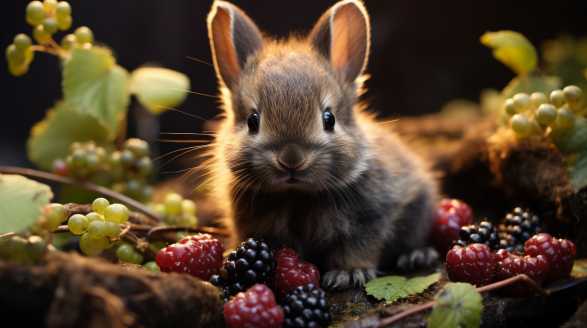
What Berries Can Rabbits Eat
Introduction Hey there, fellow bunny lovers! Are you ready to embark on a berry-tastic journey with me? What Berries can Rabbits eat? Let’s find out Not all berries are created equal when it comes to our precious bunnies. That’s why I’m here to guide you on this wild and berry-filled adventure, ensuring that you provide […]
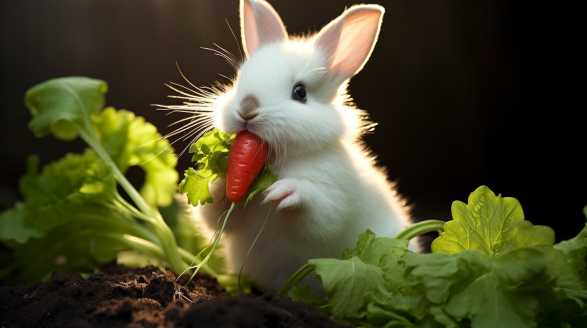
Can Rabbits Eat Radishes
Introduction Can rabbits eat radishes? Let’s find out. Picture this: a curious bunny hops into the room and sees you holding a radiant red radish. Suddenly, their eyes widen, ears perk up, and they can’t help but hop over to investigate. Well, that’s exactly what happened to me, and let me tell you, it was […]
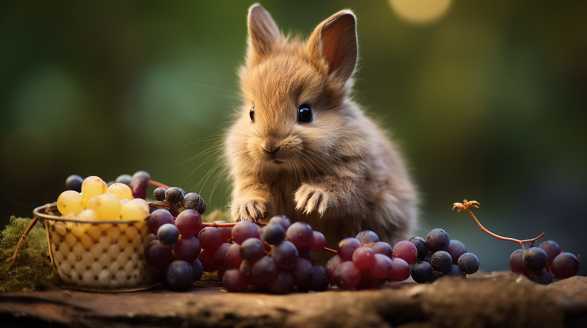
Can Rabbits Eat Raisins
Introduction Can rabbits eat raisins? Let’s find out. Are raisins a hidden danger or a delectable treat for rabbits? Let’s separate fact from fiction and explore the pros and cons of incorporating raisins into their diet. Get ready to have your mind boggled as we uncover the secret dangers and thrilling benefits of feeding our […]
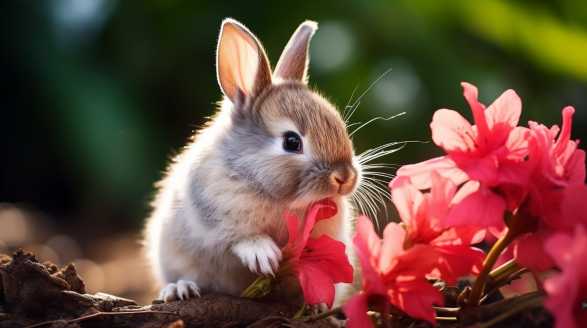
Do Rabbits Eat Hibiscus
Introduction Hey fellow rabbit lovers! Are you curious about hibiscus and how it affects our furry friends? we’re going to dive deep into the world of hibiscus and its impact on rabbits. From allergies to digestion, we’ll cover it all. We’ll begin by exploring hibiscus allergies in rabbits. Did you know that some rabbits can […]
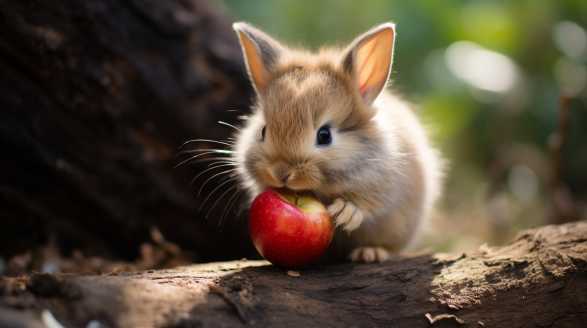
Can Rabbits Eat Apples
Introduction Hey there, fellow rabbit lovers! Are you ready to dive into the wonderful world of apples and their undeniable allure for our furry friends? Let’s find out, can rabbits eat apples? Before we embark on this adventure, we need to lay down some ground rules. You see, rabbits have delicate digestive systems, and we […]
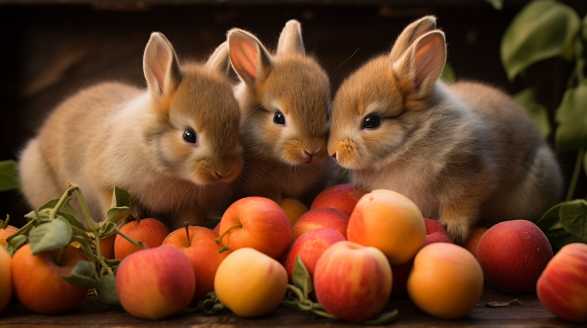
Can Rabbits Eat Peaches
Introduction Can Rabbits eat peaches? Let’s find out… You might be thinking, “What on earth do peaches and rabbits have in common?” Well, my curious friend, prepare to be blown away as we uncover the mysterious link between these seemingly unrelated things. We’re about to learn the secrets behind peaches and their impact on the […]
